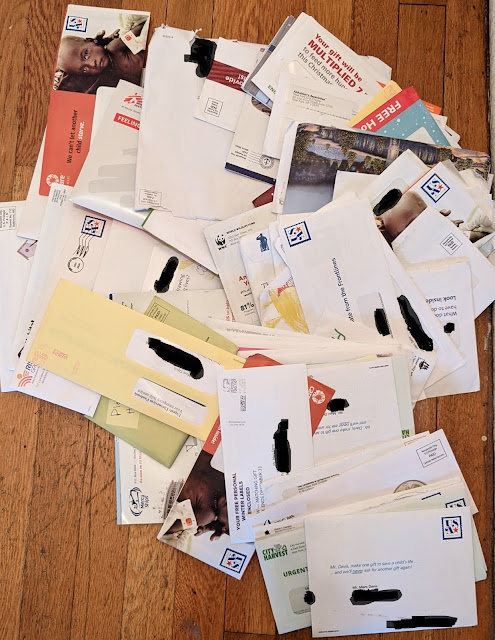When COVID hit last spring, I thanked God that I was fortunate enough to stay healthy and safe when so many people here in NYC were infected. I wanted to give back but, like many others too frightened to help in person, I chose to donate money. I donated to several charities, including some I had not given to before. That was April, 2020.
Then, starting in October, 2020, this happened:
 |
| 102 mail fundraising solicitations October - December 2020 |
I received 102 mailed fundraising solicitations from charities to which I had never donated. Most of them were related to feeding people -- in Africa, South America, and Manhattan. Others were for: environmental causes; providing medical care to people in faraway lands; building houses; preventing people from being born with disabilities; helping people born with physical disabilities, orphans, wounded veterans, Native American children, Native American senior citizens, "inner city children" who can't afford a Catholic education, and one that appeared to have something to do with housing recovering drug addicts in hotels.
Many of the classic direct mail fundraising techniques are included: blind envelopes, pictures of children near death; envelope teasers reading "URGENT NEED NOW", "EMERGENCY APPEAL" or simply "PLEASE"; envelopes a layperson might think had been hand-addressed and stamped; tear-jerking letters; promises that my donation would be matched by a mysterious benefactor; business reply envelopes; blessings by nuns; Christmas cards; a decade's supply of return address labels; pens; baby socks; and so on. If you have created or supported direct mail fundraising solicitations, you know these packages.
It appears to me that one or more of the charities that received money from me in spring 2020 chose to make some more money by including my name on a rentable mailing list. I was included on a Hot List of new donors or a timely "COVID Giving List" of sorts.
There is a part of me that feels negative about this experience. I could go into a rant about how the federal government subsidizes charities with lower postage rates, or how many of these organizations are charities in name only because they pour more money into soliciting donations than they do actually supporting their supposed cause. But, hey, that's the nature of the medium.
(Personally, I'm a bit disappointed at myself. I typically research charities, preferring to contribute to those that have low administrative costs and can demonstrate how they are effectively using the money given to them. I didn't fully vet the three that potentially had actualized additional funds from my proactive donation. That's my personal lesson today.)
I looked back at my donation history and narrowed down the list of charities that broke my heart to three. I won't name them here, but I know who they are and I know I will never donate to them again. That type of charity merits a type of Fail for List.
Direct response marketing guru Joan Throckmorton taught me something I wish I had recalled last year: When doing business with a new organization, consider using a fake middle initial. When you see that middle initial show up elsewhere, you know where it came from. So, that's my direct marketing lesson today.
OK, that and including baby socks in your fundraising solicitation is pretty crass.
Lesson:
If you want to see how information about your personal activity is shared and sold, use a fake middle initial. You have 25 of them to work with, so go at it.
No comments:
Post a Comment